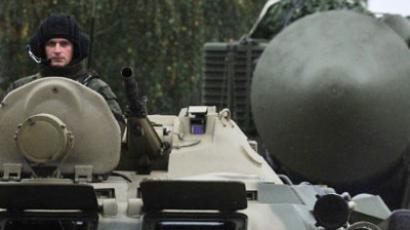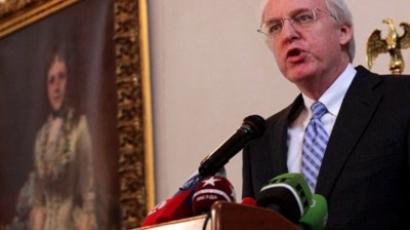Pen mightier than sword, Russia insists

In the spirit of transparency, President Dmitry Medvedev has reiterated Moscow’s need for written guarantees that the US missile defense shield in Europe would not be targeted at Russian territory.
Medvedev was meeting with US President Obama on the sidelines of the APEC Summit in Honolulu, Hawaii.On his way back from the summit, Russia’s Foreign Minister Sergei Lavrov spoke more about the situation. "It was said: if we are heard – and President Medvedev made a clear statement to Obama – we want to have some clear guarantees on paper.”The Foreign Minister mentioned “problems with the Congress” as the reason for Washington’s foot-dragging on what should be a mere bureaucratic formality.“If there are some problems with the Congress, as we are told – no one has ever tried to give us the guarantees," he said.Although the Democrats have their man in the Oval Office, the Republicans continue to enjoy an unprecedented amount of influence in the Washington decision-making process. Former Vice President Dick Cheney, for example, who began his Washington career back in 1975 as Gerald Ford’s chief of staff, almost singlehandedly defeated Obama’s efforts to shutter Guantanamo Bay detention facility, a task that the president had promised to complete once in office. Four years on, the facility branded ‘the GULAG of our times’ by Amnesty International is still open for business. Now, with the Democrats and Republicans hitting the trenches for next year’s presidential elections, Obama will be wary of giving the opposition any extra ammunition in what promises to be a political mud-fest. Meanwhile, Medvedev, noting the mixed signals he is getting from Washington, announced that he would make a decisive statement on the issue soon."It is unclear to us what our partners are offering, and I think we will in the near future determine what we should do with the European missile defensive system," Medvedev said at a press conference after the APEC Summit. "I believe that in the near future I will have to give a complete assessment on how Russia is to react to the developing situation now, as well as after 2012.”Although Medvedev lauded the achievements forged with Obama, he acknowledged that this particular area is proving thorny. "In regard to the European missile defense system, the situation is much more difficult," he said.Russia has expressed its staunch opposition to the deployment of a US missile defense system near its borders, claiming it would present a security threat. NATO and the United States argue that the shield would help defend Eastern Europe against a hypothetical missile attack from rogue countries, usually identified as Iran. The cost of this unproven security against such a threat, which many analysts say is dubious at best, could turn out to be nothing less than Russia’s friendship.President Medvedev has warned of an imminent arms race unless the US and NATO find a way to cooperate with Moscow in the project.“After 2020, if we do not come to terms, a real arms race will begin," the Russian leader warned in May at the G8 Summit in Deauville, France.Most frustrating to Russian diplomats is that Moscow and NATO agreed to cooperate on the European missile shield during the NATO-Russia Council summit in Lisbon in November 2010. Later, however, NATO began to argue there should be two independent systems that exchange information. Russia favors a joint system with full-scale interoperability.Meanwhile, the unfurling shield continues to encroach on Russia’s ‘near abroad’. Bucharest announced in May that it had reached an agreement with Washington to deploy US missile interceptors at a defunct Soviet airbase on its territory. At this point, Moscow issued an urgent request for legal assurances from the United States that the system was not designed to target Russia's strategic nuclear forces.Although such a simple gesture would do much to put Moscow at ease, Washington has so far declined to provide any written guarantees.Robert Bridge, RT














